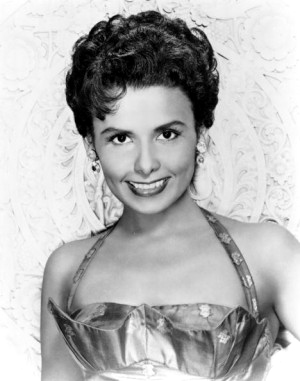The wonderful singer Natalie Douglas's celebration of Lena Horne has been acclaimed at both Birdland and Feinstein's at Loews Regency. She's bringing the show, titled, To Lena: A Tribute to a Lady and Her Music, back to Birdland this coming Monday, May 17 at 7pm -- a performance that will be all the more affecting with the passing of the legendary Lena on Sunday, May 9, 2010 at age 92. I called Natalie to talk about the show a few days before Ms. Horne's death, and then I called back the day after to offer my condolences. Here's some of what she had to say:
MICHAEL PORTANTIERE: I know that Lena meant a lot to you. How are you feeling?
NATALIE DOUGLAS: Of course, I'm very sad. We didn't have a personal relationship, and yet I feel deeply affected by her death. Everything I can think of to say is so clichéd. She was one of the greats, and now she's gone. Thank God we have the legacy that she left.
MP: I don't suppose you've had time to think about how you're going to reference her passing in the show on Monday.
NATALIE: Not specifically. What strikes me is how many performers -- black women especially -- talk about what a formative experience it was to see her in movies, or in her Broadway show, or on "Sanford and Son," or singing with the Muppets. She definitely had something that made us want to do that, and made us feel almost personally encouraged by watching her. Lena Horne quite literally broke down the doors in allowing that to be possible for black women. So I'm not sure exactly what I'll say about her passing, but I think I'll approach in terms of how she influenced so many performers.
MP: I missed your show at Birdland and at Feinstein's. Can you tell me about it?
NATALIE: There's a lot of great music in it. One of my favorites is, "I Love to Love," a Herbert Baker tune; it's a little naughty but terribly, terribly proper. I like to do "Ain't It the Truth" from Cabin in the Sky, and I really enjoy singing some of her nightclub tunes, which a lot of people don't know. I also love "Can't Help Lovin' That Man." Lena held so many emotions about that song, because she was so happily anticipating doing the role of Julie in the movie of Show Boat, and she was deeply disappointed and hurt when she didn't get it.
MP: Is there a fair amount of historical information in the show?
NATALIE: Lena was a complicated woman, so it's not easy to tell her life story. There are things about her that are hard to understand without a lot of the background and history. I try to do a show that, if you love Lena and you don't want to hear anything negative about your favorite, I'm not going to offend you; but if you know some of the stuff about her life that's a little rougher, you'll understand that from the context. There are all different levels of knowledge of about Lena. I think a lot of people don't know much about her aside from "Stormy Weather" and knowing "Oh, my God, she was so beautiful." People who saw her one-woman show have a little bit more information, but there's a younger group who only know her from "The Wiz" or "The Muppet Show" or whatever. So I try to talk about some of the realities of her life and how she got from one place to the next.
MP: I haven't yet read James Gavin's bio of Lena Horne, but I'm looking forward to doing so.
NATALIE: There are so many bios about Lena. She was not shy about telling her story, it's just that it wasn't the whole story. There were different versions of it. In my show, I try to be truthful about her, but I find it easy to give her a break in terms of some of the stories that show her in a less flattering light, because I think I get the anger she had seething beneath the surface. It's so easy to understand that anger, given the times she lived in and what she was up against. So many of her performances for so much of her career were about skimming the surface; she did these light, sophisticated, enjoyable shows, the kind of thing that café society enjoyed, but there was all that anger and passion seething underneath. It's fascinating.
MP: Did you ever get to see her perform live?
NATALIE: Yes. My mom brought me to see The Lady and Her Music in Los Angeles, and we got to go backstage and meet her. She couldn't have been more gracious. That show was just spectacular; I've never forgotten it. On my first album, there's an arrangement of "Bewitched, Bothered, and Bewildered" that I created with Charlie Lindberg; I really wanted to sing it because I had heard Lena do it in her show, in a way that I had never heard anyone else do it. It was the first time I realized that this old standard, which I had heard a hundred times, was all about sex. I never knew how illicit the song is until I heard Lena's take on it. She taught me a lot about how you can approach a song from different points of view -- like, for example, the two versions of "Stormy Weather" that she did in The Lady and Her Music. She was a remarkable woman.
[END]


